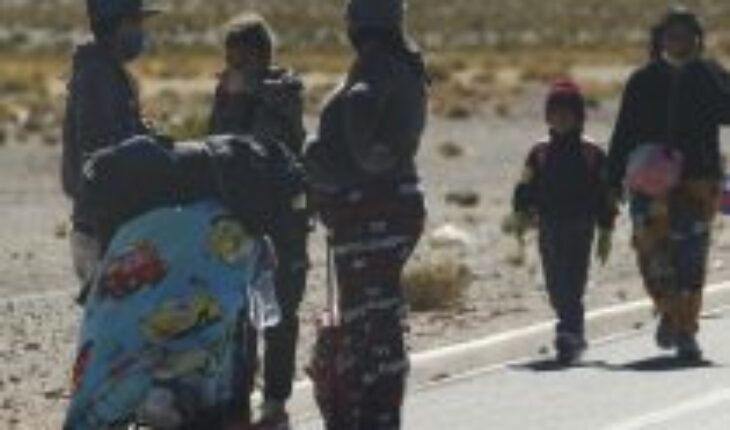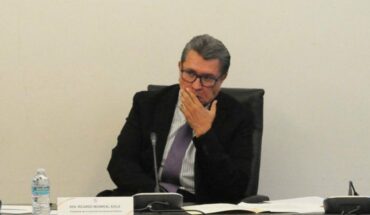Shock has generated during the last months the images of the humanitarian crisis that is lived in the north of Chile, being the region of Tarapacá one of the centers most affected by the conflict, which has deepened since the first migrant eviction occurred in the month of September, in which families, women and children were thrown from makeshift camps into the streets and beaches outside the city, in complete vulnerability. Since then, the state and migration crisis has not been fully resolved and the conflict has erupted again, leaving a significant balance in terms of public security and human rights.
In conversation with El Mostrador Braga, the social worker and doctor in Sociology of the Arturo Prat University, Romina Ramos said that “there have been attempts to address the situation”, however, it does not end up being resolved. “According to the results of the latest report of the International Organization for Migration (IOM) on the situation of venezuelan nationals in a situation of forced displacement in Chile during 2021, 70% of people come with children in very deplorable socioeconomic conditions, we are talking about people who do not have money to eat more than a week,” Explained.
“Violent crime rates have also increased mainly in the last six months,” she points out and considers gender-based violence among them. “Migrant women suffer triple violence and if they are mothers, the situation is even more complex, so it is necessary to intervene at all levels with a gender perspective, but from an intersectional perspective, because vulnerability is not only because they are women, it is nationality, poverty, if it belongs to Afro-descendant communities, among others,” Indicated.
The way out solution to the September conflict
From the first migrant eviction that occurred at the end of September in the city of Iquique, some solutions were considered to alleviate the crisis, among which improvised camps were generated to receive families of migrants in the towns of Colchane, Huara and Lobito beach, a solution that, in the view of the social worker and the groups that accompany migrants in the north, are ineffective, “They are in precarious situations, both venezuelan nationals and workers. There have been difficulties in being able to attend to the health situation and most of all it is like a space to be able to welcome, but that does not cope and that does not meet the minimum that a reception space should have, “he said.
According to Ramos, the minimum is that the situation of migrants in a condition of forced displacement should have the attention of the State, not mere assistance in a camp. In Colchane, the camps were destroyed by the rains, they are given only a few snacks to eat. “Imagine that children have a loss of schooling of one year, they have health problems, also safety problems (…) Most of them all they want to have is food, water and a safe place to sleep,” he said.
Security and victimization
Regarding the issue of security, he comments that there has been an increase in violent crimes and it is precisely those that have high public connotation. In this sense, he considers that migration policies are circumscribed within a crisis that concerns the State and national policy whose consequences have impacted the population, “there is indeed a security problem, effectively the feeling of insecurity in people (victimization) has increased,” he said.
“Violent crime rates have also increased mainly in the last six months, where they have been victims – this in the words of the regional prosecutor – where she says that, ‘people who are victims of violence are also foreigners’. In global terms, only 3.8% of the people who have committed crimes are foreigners, but it exists and “we must take care of the feeling of insecurity that has to do with many issues, I think the inability to address a phenomenon that is complex on the part of the institutions in charge,” he said.
Assistance approach and situation in camps
In the midst of the development of the conflict, one of the worrying events was that the places of reception enabled for migrants in Iquique were also violated in the midst of a context of powerful violence and chaos in the city.
In this sense, the social worker stressed that “in terms of camps, of course, between being on the street and being in a tent where you can access a snack and see the possibility of them moving, that is certainly better, but I insist that these camps are not in condition, that is, they should not operate if they do not guarantee security, protection and legal, psychosocial assistance; especially in migrant children and pregnant women who are tremendously affected in terms of access to health.”
To close this point, Romina reflected on the uncertain future of this crisis, on the responsibilities that the State of Chile delays in assuming and on the hostility that has been created among citizens, “I think that violence is tremendous, racism, xenophobia, there is a lot of hostility in the region towards people from foreign communities, but we must see that in this situation there is also institutional violence, we could talk about state racism, because violence is not towards all migrants, it is towards certain people, such as Haitians and Venezuelans.”
Therefore, “the approach has to be comprehensive and that is what we have not seen so far” and listed some factors that in his opinion are necessary to keep in mind when analyzing the crisis, among them he stressed that, “the increase in irregularity exposes them to situations of labor exploitation, impossibility of accessing basic means for subsistence, those that finally end up extending the condition of vulnerability to families,” he said.
In this line, he ends by expressing that from the symbolic point of view it is worrying that hate speech can provoke confrontations between civil society, “because fear is there and it is very difficult to address when there is no political will to generate, for example, anti-racist awareness campaigns. I believe that here – and in the face of the public question – there is an effort that we must all make and that is to separate migration from crime, because from that link is that it criminalizes all migration and does not put the accents on the relevant issues for a region that has suffered a historical abandonment “. Ended.
Migration crisis in Iquique: “Migrant women suffer three times as much violence, and if they are mothers, the situation is even more complex”
February 7, 2022 |





